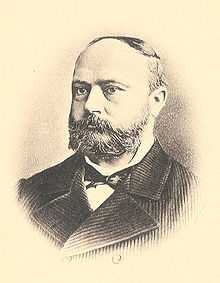Rudolf Baumbach
| Rudolf Baumbach | |
|---|---|
 | |
| Born |
28 September 1840 Kranichfeld |
| Died |
21 September 1905 (aged 64) Meiningen |
| Nationality | German |
| Occupation | Poet |
Rudolf Baumbach (28 September 1840 – 21 September 1905) was a German poet.
Life
Born in Kranichfeld in Thuringia, Germany, the son of a local medical practitioner, he received his early schooling at the gymnasium of Meiningen, to which place his father had moved. After studying natural science at Leipzig as a member of the German Student Corps Thuringia and in various other universities, he engaged in private tuition, both independently and in families, in the Austrian towns of Graz, Brünn and Trieste. [1]
In Trieste he caught the popular taste with an Alpine legend, Zlatorog (1877), and songs of a journeyman apprentice, Lieder eines fahrenden Gesellen (1878), both of which ran into many editions. Their success decided him to embark upon a literary career. In 1885, he returned to Meiningen, where he received the title of Hofrat, and was appointed ducal librarian. He remained in Meiningen for the twenty years until his death on 14 of September 1905.[1]
Baumbach was a poet of the breezy, vagabond school and wrote, in imitation of his greater compatriot, Joseph Viktor von Scheffel, many excellent drinking songs, among which Die Lindenwirtin ("The Linden Hostess") has endeared him to the German student world. But his real strength lay in narrative verse, especially when he had the opportunity of describing the scenery and life of his native Thuringia. Special mention may be made of Frau Holde (1881), Spielmannslieder (1882), Von der Landstraße (1882), Thüringer Lieder (1891) and his prose, Sommermärchen[2] ("Summer legends", 1881).
References
- Attribution
 This article incorporates text from a publication now in the public domain: Chisholm, Hugh, ed. (1911). "Baumbach, Rudolf". Encyclopædia Britannica (11th ed.). Cambridge University Press
This article incorporates text from a publication now in the public domain: Chisholm, Hugh, ed. (1911). "Baumbach, Rudolf". Encyclopædia Britannica (11th ed.). Cambridge University Press
External links
|